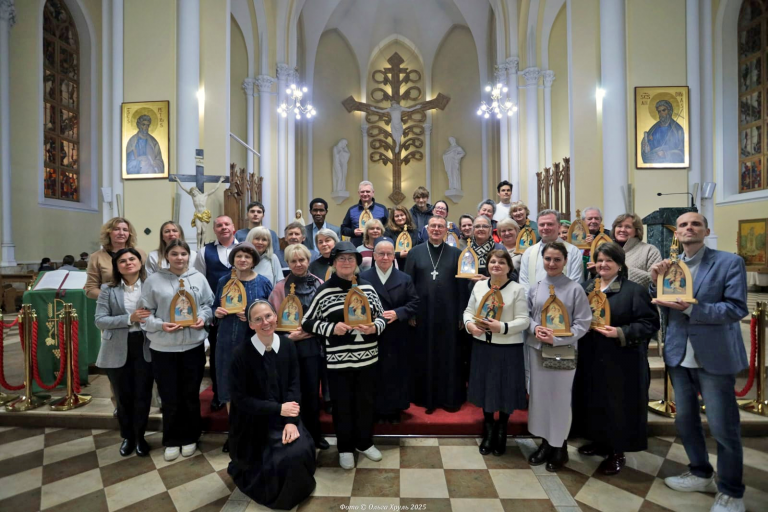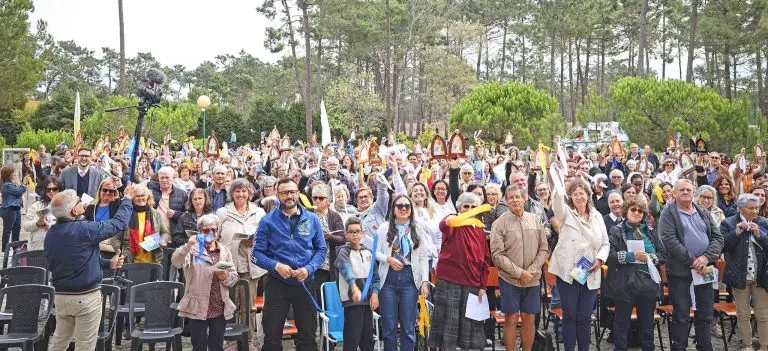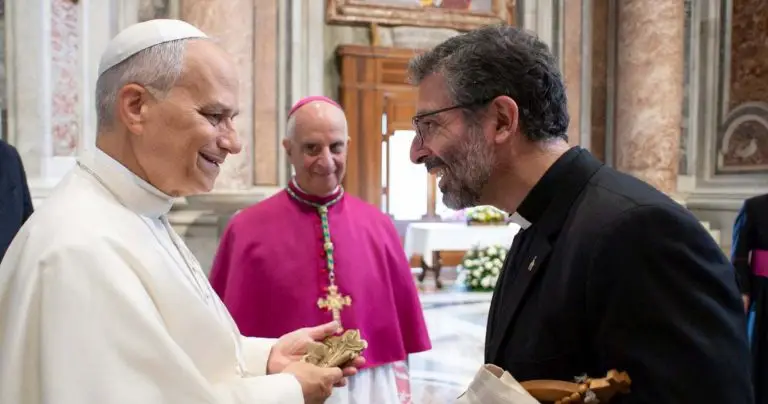On September 10, 1950, a poor man went to the Shrine of Santa Maria in southern Brazil to ask for Our Lady’s blessing and help so that he could live his baptism well as a husband, father, and merchant. Then, one of the sisters invited him to pray the rosary with a family. At the end, he kept the image with which they had prayed the rosary.
Bishops, nearly twenty priests, academic researchers, and representatives from twenty-five nations, where millions of people follow the example of this poor man, declared worthy of veneration by the Vatican, gather to discover the mystery of João Luiz Pozzobon. On September 10, 2025, his small and fragile image multiplied into more than two hundred thousand… Instead of a single family, there are multitudes of people who continue to pray the rosary, and an academic conference brings together researchers to answer the question: What is the mystery of João Luiz Pozzobon?
“It is God who does it,” says Archbishop Leomar Brustolin, and indeed, there is no other explanation for the “miracle” of the growth and fruitfulness of the Apostolate of the Pilgrim Mother of Schoenstatt in these 75 years, initiated by João Luiz Pozzobon.
The holiness of Pozzobon, described by those who knew him
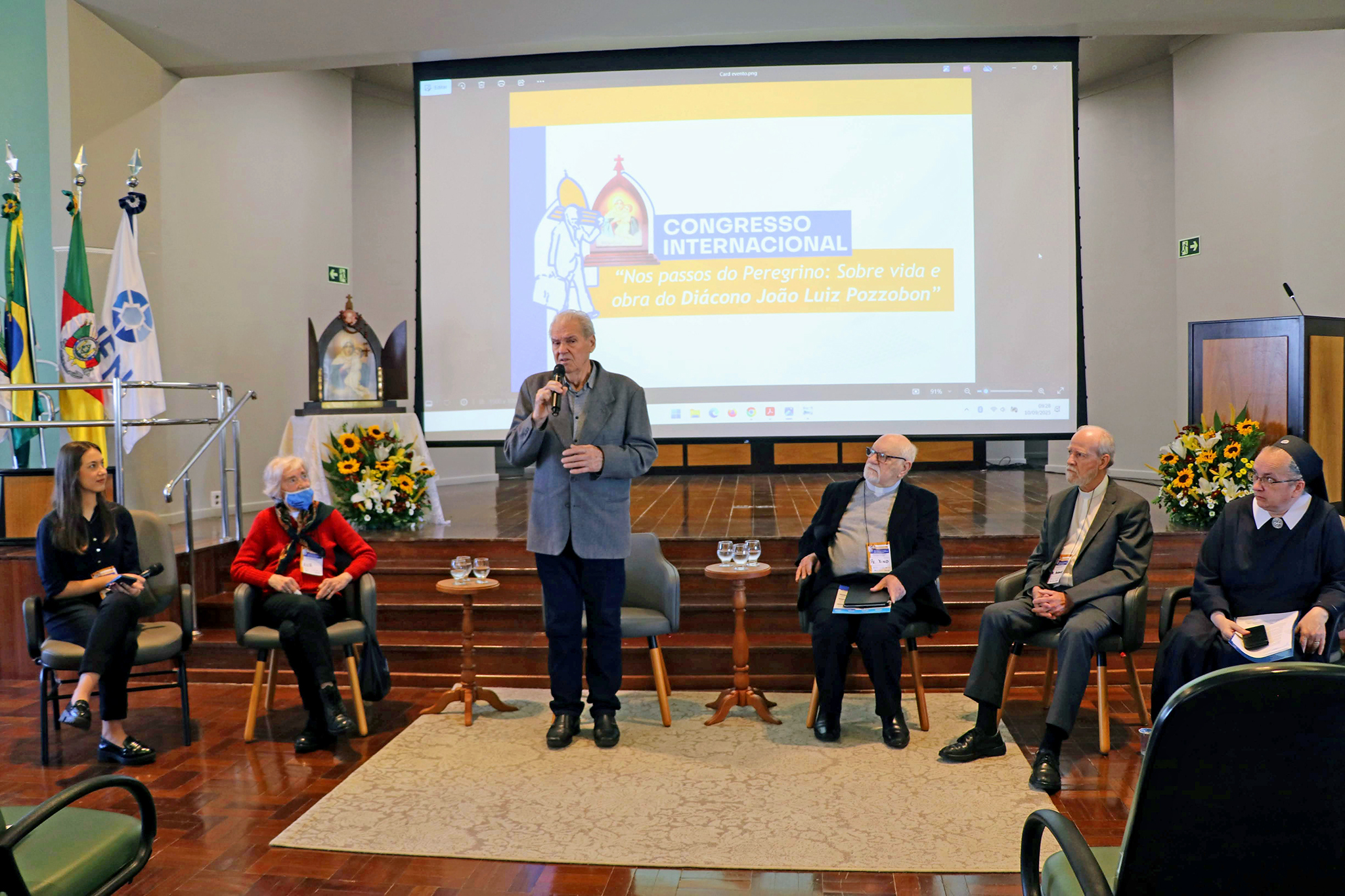
The second day of the International Academic Congress “In the Footsteps of the Pilgrim,” held at the Franciscan University (UFN) in collaboration with the Apostolate of the Pilgrim Mother of Schoenstatt in Santa Maria/RS, continues to show the greatness and depth of the life of our “little donkey of Mary,” João Luiz Pozzobon.
The panel “Fame of Holiness and Legacy of Deacon João Luiz Pozzobon” shows the results of his collaboration with the action of grace in the Covenant of Love. Father Francisco Bianchin, João Pozzobon’s last parish priest and confessor, affirms that he is certain of his holiness. Moved, the priest recounts many of his experiences in personal encounters with João Luiz Pozzobon. “He was ahead of the Second Vatican Council; he was fully aware of being a lay missionary.” Ana Echevarría, from Argentina, talks about Pozzobon’s encounters with Father Esteban Uriburu and the beginning of the international expansion of the Pilgrim Mother Apostolate, first in Argentina and then in Africa and other countries.
Humberto Pozzobon, son of the venerable, reveals some aspects of his father’s life, his childlike love for Mary, represented in the image of the Mother and Queen of Schoenstatt, which we call the Original Pilgrim Mother. For him, it was not just a picture, but a person to whom he devoted all his respect and love, and whom he treated as if she were a real person.
He does not limit himself to his actions with the Pilgrim Mother
The vice-postulator and national director of the Schoenstatt Movement in Brazil, Father Antonio Bracht, presents how Pozzobon’s holiness radiates and inspires various initiatives, such as place names and media publications that highlight veneration towards him, statues, monuments, and more. He is a person who inspires others, and the veneration towards him is expressed in the most varied ways, without us being able to control it.
The panel presentations are complemented by contributions from Sister M. Rosequiel Fávero, coordinator of the celebrations for the 75th anniversary of the Pilgrim Mother Apostolate. “João Luiz Pozzobon is not limited to the Pilgrim Mother,” she affirms, sharing her childhood experiences when her family welcomed and venerated him as a saint. She then presents some aspects of his life and information about the Apostolate of the Pilgrim Mother, present in almost all of Brazil’s more than 300 dioceses, as well as a summary of its activities and organization.
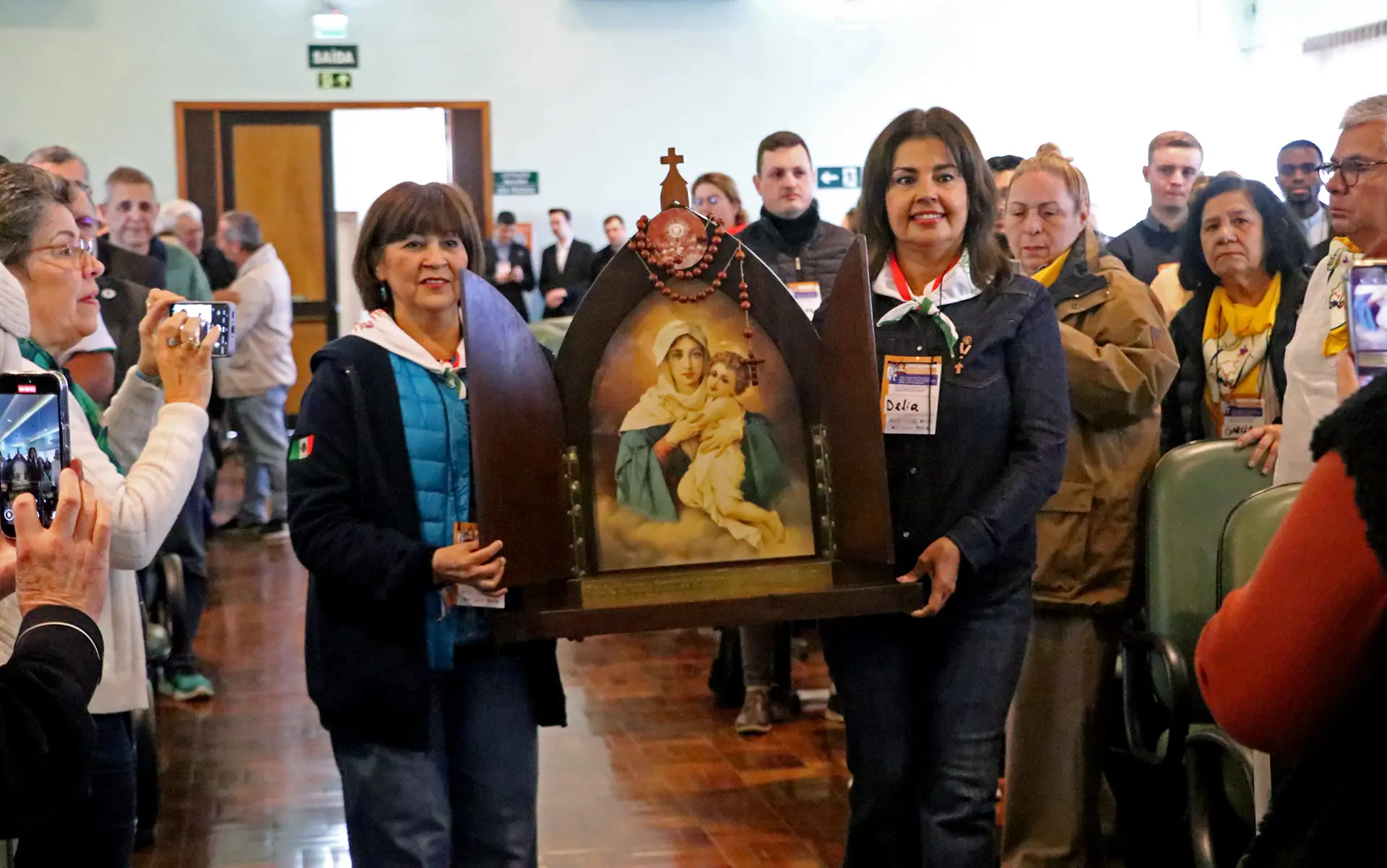
Pozzobon in one sentence
The panel concludes with each speaker’s response to what they most admire about the venerable Pozzobon. Fr. Francisco responds: “His simplicity and persistent fidelity.” Fr. Bracht: “The mystic of the roads.” Humberto Pozzobon: “The courage to overcome and never be discouraged.” Ana: “His love for the Blessed Mother, his relationship with the Pilgrim Mother, his love for the rosary and the Eucharist.” And Sr. M. Rosequiel: “His apostolic creativity.”
During the break, it becomes clear that languages and cultures are different. Still, everyone’s lives have been touched by the greatness of this “little student of Fr. Kentenich,” the great and venerable João Luiz Pozzobon. People gather in conversations about him, and their admiration for him grows with each facet of his life that is revealed in each presentation.
From the Dicastery, admiration and momentum for the future
After a brief cultural moment from the Italian community, with their songs and traditional costumes, the grand finale arrives with the conference “Holiness, cause for beatification and originality of Deacon João Luiz Pozzobon,” given by Monsignor Melchor José Sánchez, rapporteur in the process of beatification of Pozzobon in the Dicastery for the Causes of Saints. His knowledge of the details of Pozzobon’s life and his immense admiration for him left everyone enchanted. It struck those present that the word “hero” does not define the full greatness of Pozzobon: “Despite the heroism of his Christian life, he is not only a hero, but he resembles the Savior and becomes an instrument of salvation for many; he is an icon, a transparency of God’s love for many people… He allowed himself to be transformed into another Christ through his Mother, the Mother of Jesus, our Mother and Queen.”
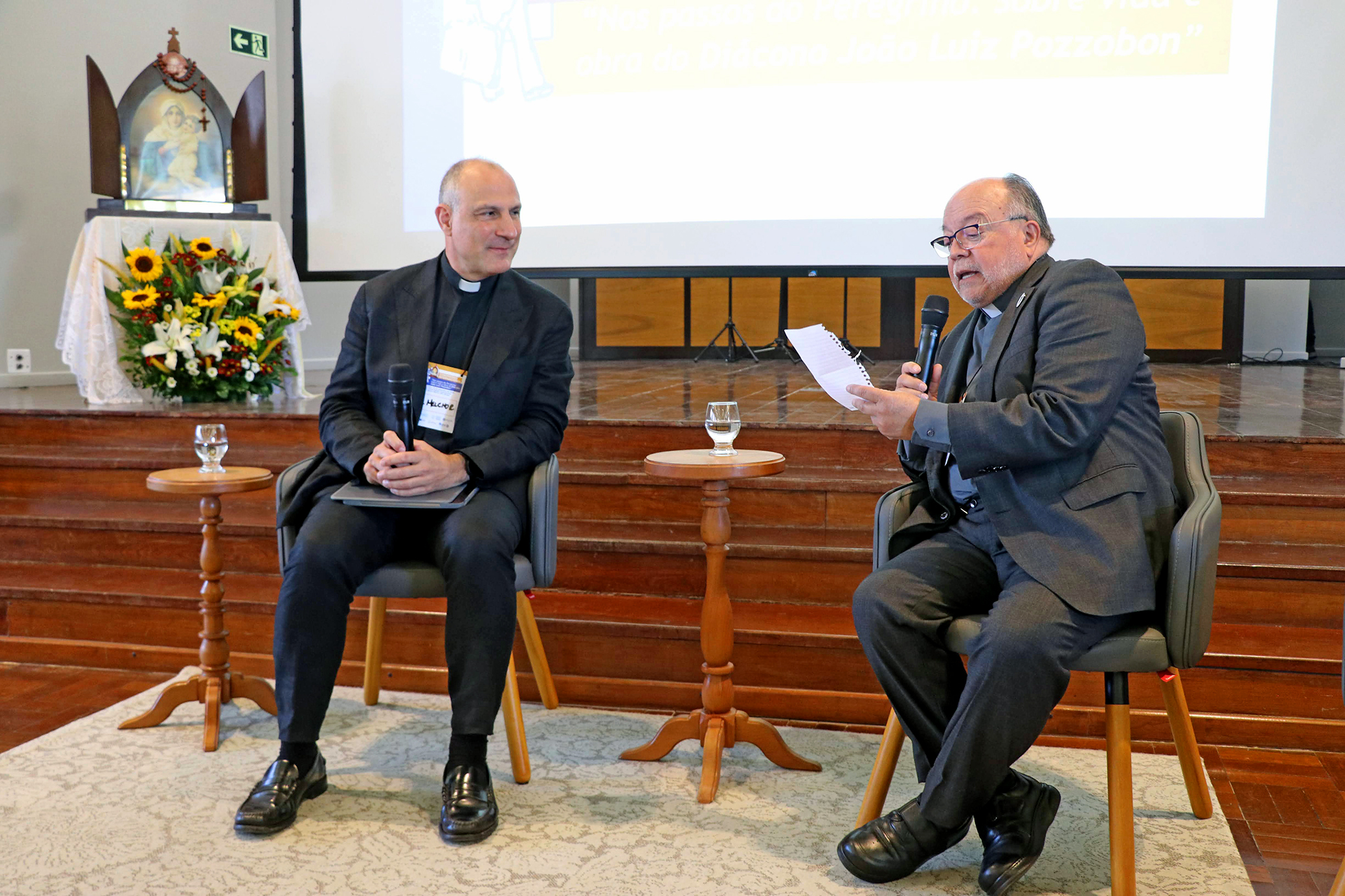
What is unique about this “saint”?
Monsignor also affirms that all saints belong to the Church, but many have a peculiar holiness that is added to their name. For example, Saint Monica, the mother of Saint Augustine. And he asks himself: “What is the peculiarity of Venerable Pozzobon? It is what is written on the cover of the document of his beatification process: João Luiz Pozzobon, husband, father, and deacon.” He then speaks at length about his admiration for the example of the venerable as a husband and father. He concludes by stating that Pozzobon is an example of a permanent deacon who never abandoned his family because of his mission. He lived his consecration to Mary with great depth and also stood out for his love of the Eucharist.
“With his canonization, Pozzobon ceases to belong to the Schoenstatt Work and becomes of public utility to the universal Church,” concludes Monsignor Melchor, explaining that this must be accepted because a saint transcends all limits and belongs to the whole world, thanks to his example of life, which captivates everyone and enriches the entire Church.
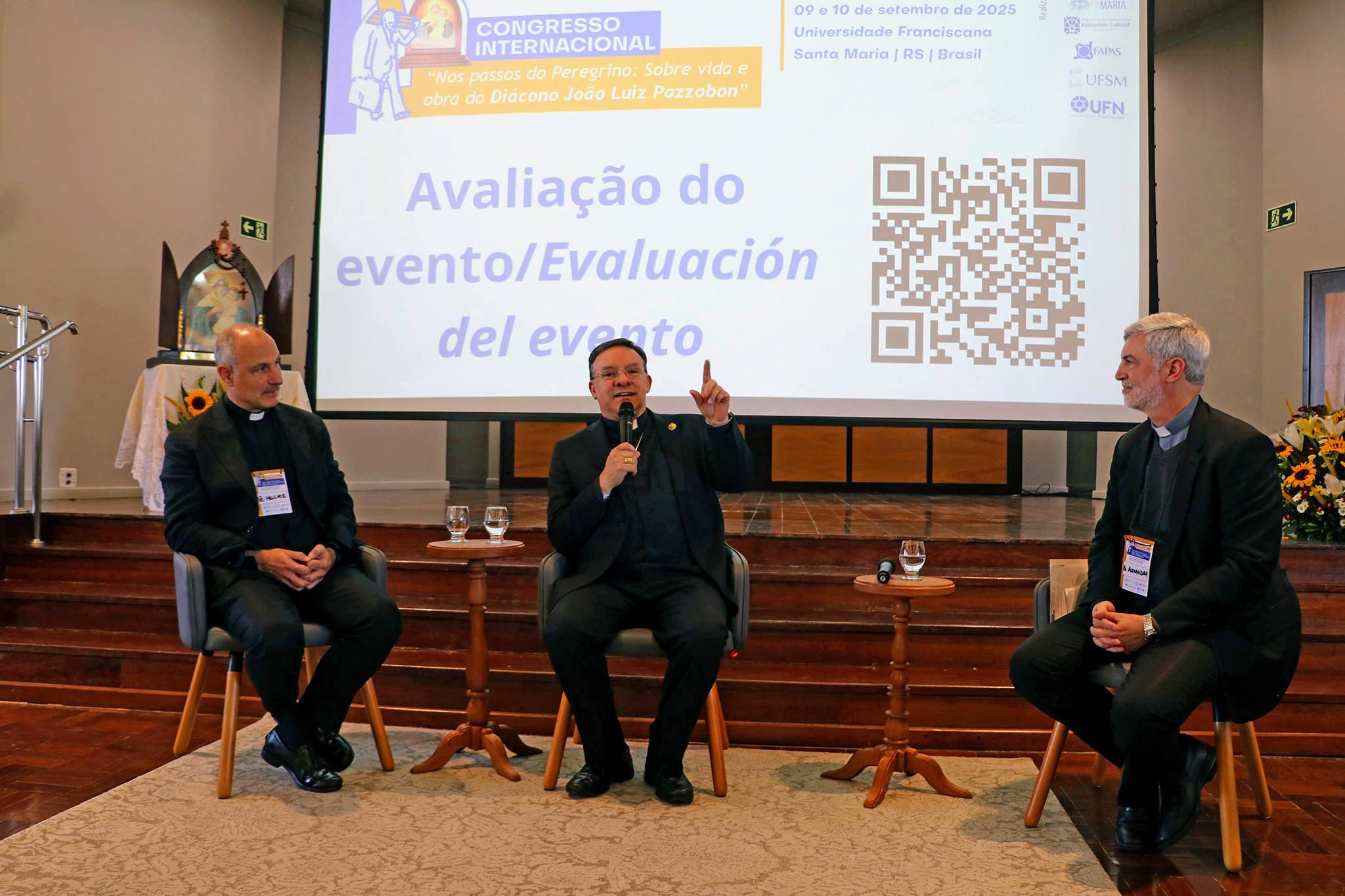
The participants have their say…
Ana Lía Quijano Morenés, from Spain, shares: “This congress is a confirmation that I am part of an apostolate project with the Pilgrim Mother. It gives me great joy and confidence to continue in the mission. No one forces me to be a missionary, and many people in Spain do not understand me, but that has never stopped me from continuing my work. My strength comes from the Covenant of Love. The Blessed Mother has guided me, for example, to this Congress in Brazil.”
For Flávio Antônio, deacon and president of the Regional Commission of Deacons South 3, the Congress “was a life experience, one of great humility. Seeing and witnessing the testimonies, the legacy of a simple life, and Pozzobon’s love for the Pilgrim Mother leaves us, as he himself said, ‘a mark on our hearts.’ At this Congress, we fed on his knowledge and felt the Pilgrim Mother massaging our hearts and preparing us for the diaconal mission.”
At the end, Father Alexandre Awi Mello thanked each of the teams that organized the event, Father Vitor Hugo Possetti, representing the various teams, Archbishop Dom Leomar Brustolin, who instituted the Pozzobon rectory, and all those who worked on the cause of Venerable Pozzobon. The archbishop also thanked all those who worked hard to make this event a reality and those who were present.
Translation: Sr. M. Lourdes Macías

